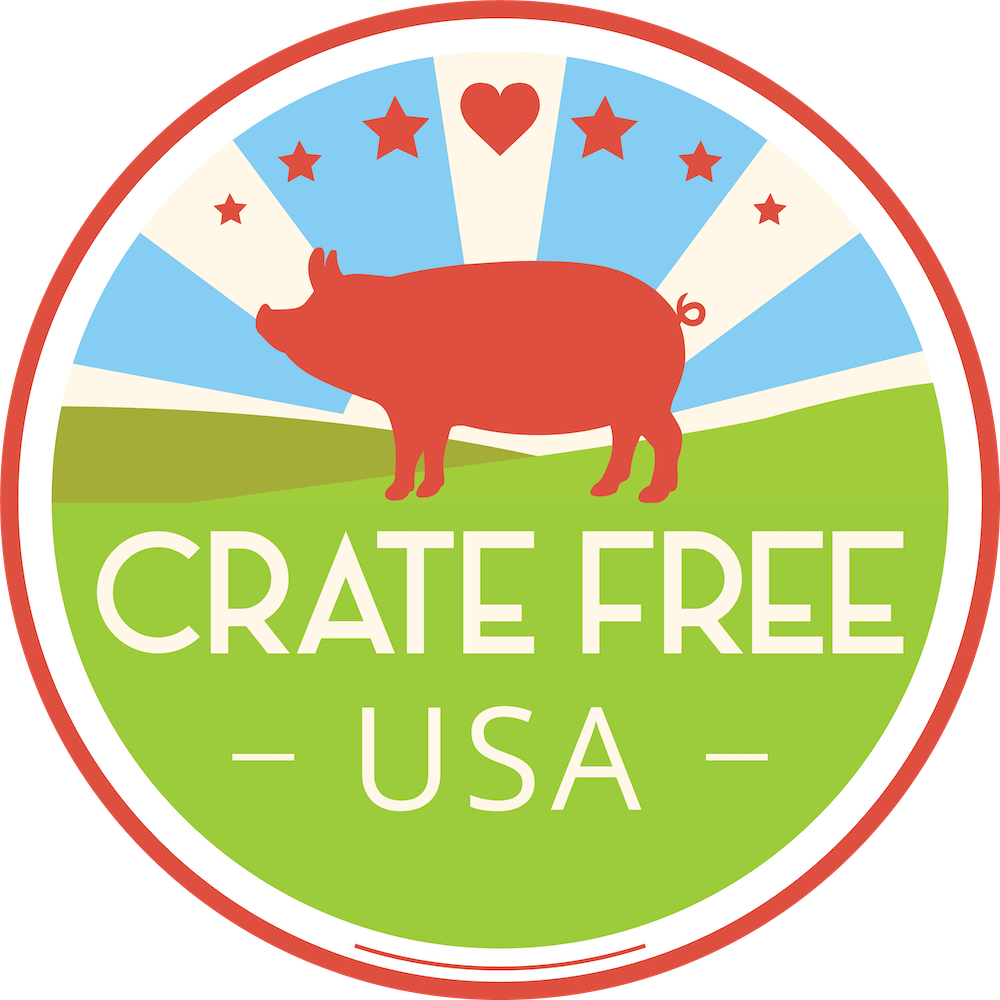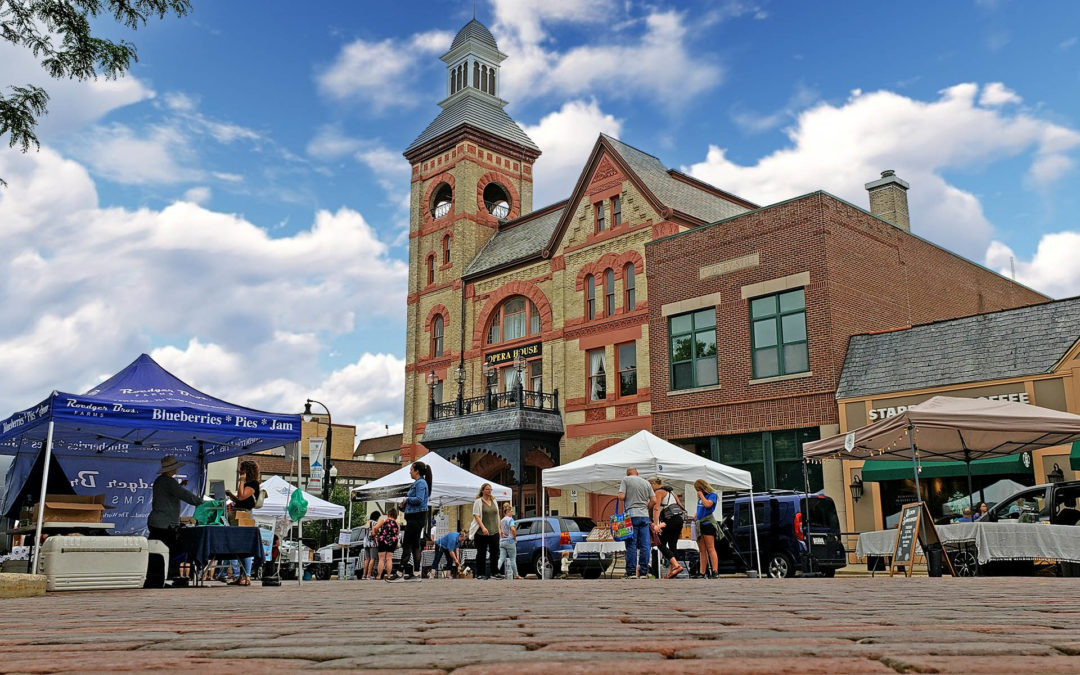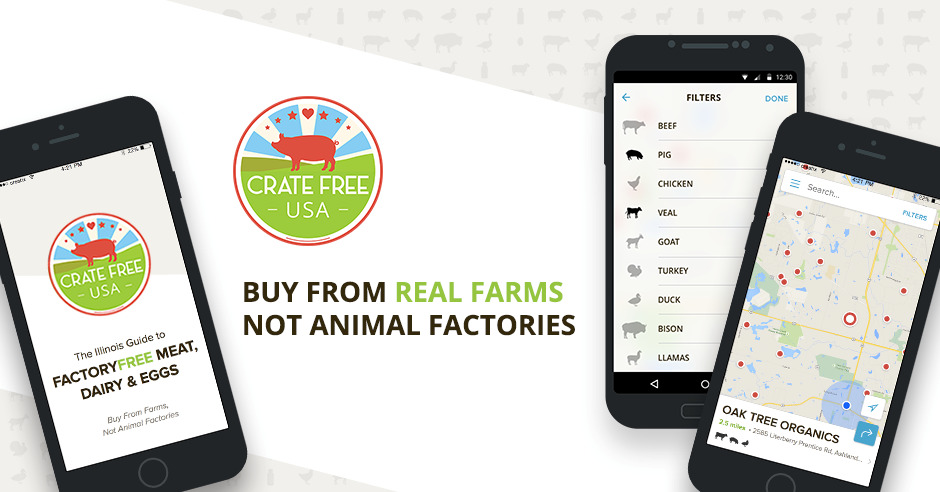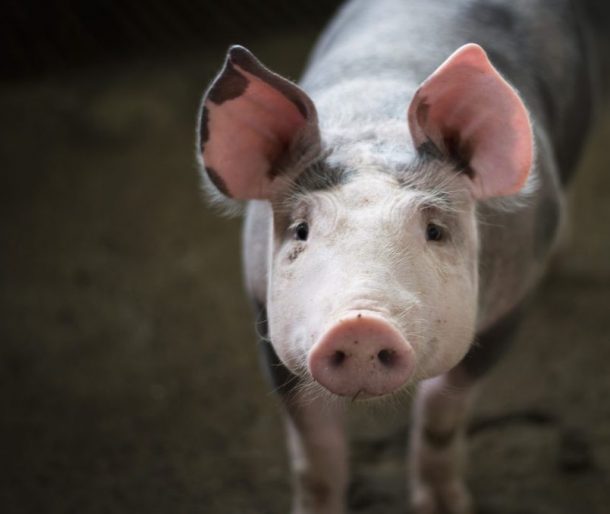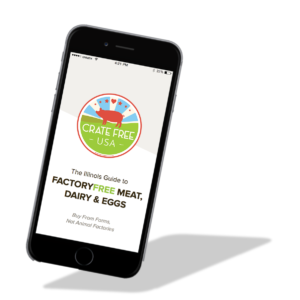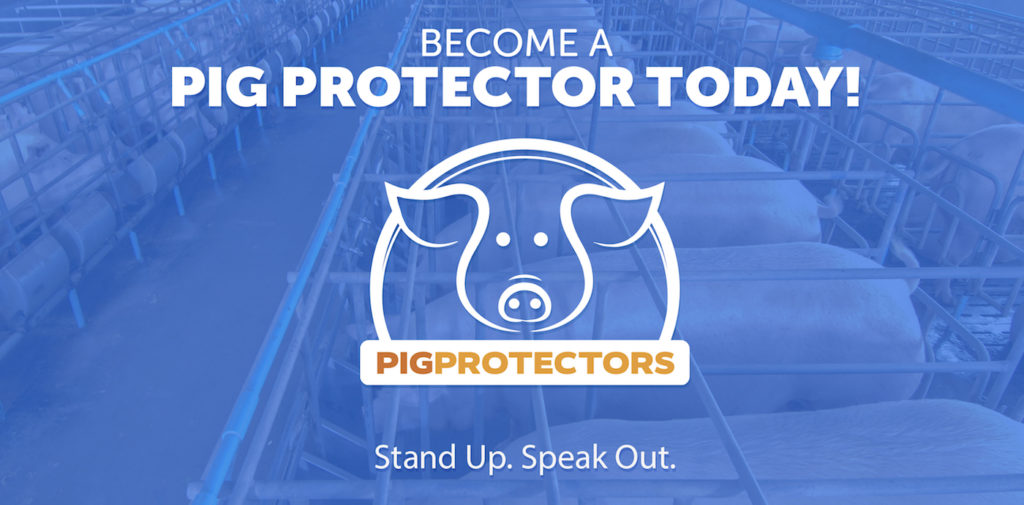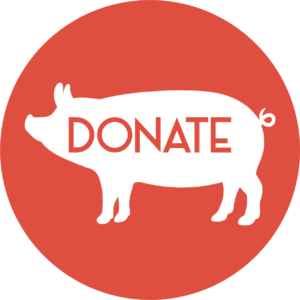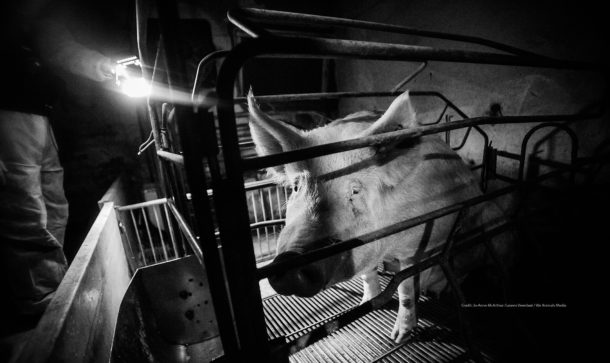By Sam Damiano
Shopping for sustainably raised meat and dairy products is seen as a luxury. In supermarkets, products labeled certified humane or pasture raised are typically more expensive than their counterparts from industrial farms. Households that receive assistance through the federal Supplemental Nutrition Assistance Program (SNAP) typically are not able to justify the extra cost while trying to feed their families on a budget. In addition, many households in need will forgo food assistance programs because of the stigma associated with using these benefits. At Crate Free USA, we believe it shouldn’t be a privilege to buy nutritious, healthy, ethically raised meat and dairy.
Kelly Kempf, manager of the farmers’ market in suburban Woodstock, Illinois, shares our sentiment and is taking action. She is pushing for food equity and accessibility at her market by proudly accepting Link cards, the electronic method of distributing SNAP benefits in Illinois. The Woodstock Farmers’ Market also participates in a Link Match program, funded by private donors, to make locally grown food attainable for everyone. We recently visited Kelly at the Woodstock Market to chat about her ongoing efforts to make the market fun and accessible for anyone who attends.
What does your role as market manager entail?
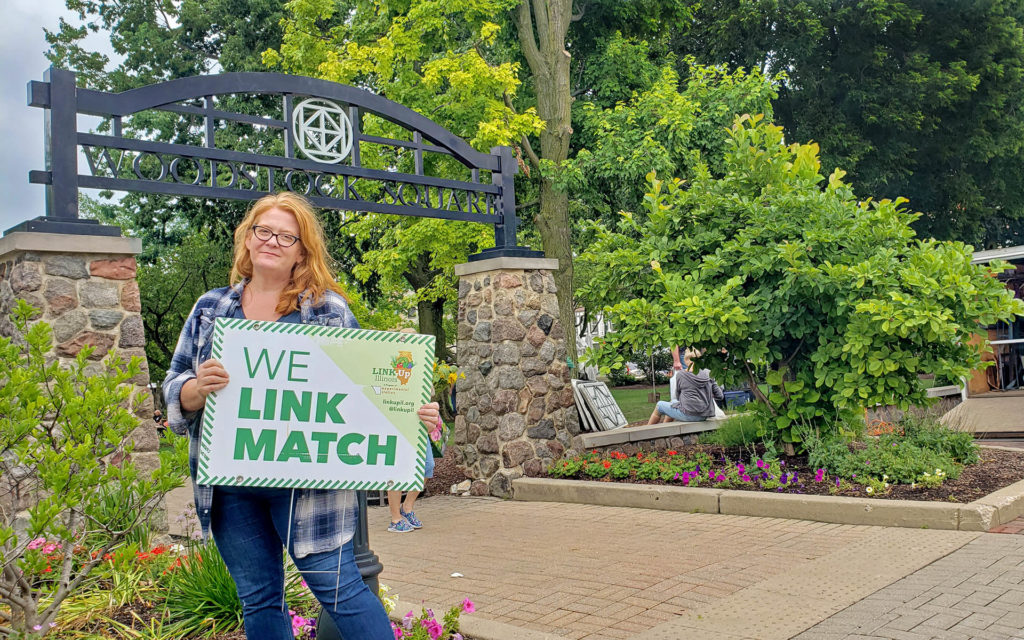
Kelly Kempf, market manager of the Woodstock Farmers’ Market
As the market manager, I do everything that the market needs from choosing our vendors, which includes visiting their spaces to make sure that everything is ethical and made onsite, to day to day management of market, customers, Link program, and marketing. I even fill the bubble machine! Whatever needs to get done at the market, I do.
How is accepting Link so vital to our food equality efforts?
When we fight food insecurity at the very bottom, then everybody else rises. Every farmers’ market should be addressing how people eat, and who is eating with them.
Every person should have dignity when they eat. When they feed their families, no family should be afraid of how they are going to provide their kids healthy, nutritious food. I don’t think anyone in this market, whether it is someone that is working at a booth, running a farm, pulling weeds, or someone like me doing marketing got into this to make money. We got into this to feed people. And if we can have healthier kids and healthier families, we’ll have a healthier community.
How does accepting Link benefit the community?
Link dollars can be used at Walmart and Aldi, but where does that money then go? To feed corporate greed and pay low wages so that workers need these same benefits? We’d like those dollars to stay with a family who actually digs these vegetables out of the ground. Giving farming families these dollars in turn keeps them out of the “system.” The Link dollars are going to happen no matter what. The politicians argue for that allocation, we’re arguing for them to stay here, in our community. A family will be happier and healthier at the market when they are breathing fresh air, listening to live music, talking with their neighbors, and being part of our local community.
How does the Link Match program work?
Any Link purchase receives matching vouchers for fruits, vegetables, or mushrooms to spend at the Woodstock Farmers’ Market. It allows people to use their Link money smartly. They can spend $25 on sustainably raised meat and then get $25 for locally grown produce.
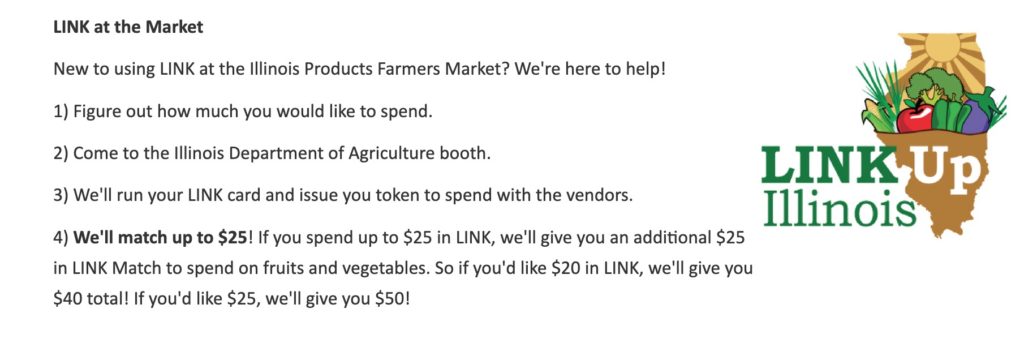
When we swipe their Link card, we give out tokens to use around the market, which look just like the tokens a patron would get when they swipe their credit card. With the help of private funds, (right now through the Experimental Station in Hyde Park) we are able to give matching produce vouchers. We are lucky that we can match dollar for dollar, every $25 swipe. We have to swipe in $25 increments, but it’s a pretty big reward to double someone’s food benefits.
View this post on Instagram
We do $600-$1500 in Link swipes per market. With two markets a week, families really are coming to the markets to buy groceries. The meat vendors have seen a dramatic increase in Link participation since the start of the Link Match program.
Why is this so important to you personally?
Farmers’ markets are a culture. It’s not just a place to buy food. You meet other like-minded people. A market can dictate who the people we will meet and spend our weekend with are. If you’re not inviting everybody to your market, then why are you doing it?

Family fun at the Woodstock Farmer’s Market
We advertise front and center that we take Link, we want to let people know that they can come here, they are welcome here and we want them here. We try to have free family activities, so that all families feel like their kids belong here too. Everything here is accessible.
Do you foresee Link and the Link Match Illinois program becoming a payment option for independent farms in the future? How can we make it happen?
The Link Match program is trying to expand as we speak, into co-ops and stores. More and more farmers are trying to become educated on this. Bringing people to their farms is good for them. It’s even easier at a farm store, instead of the tokens, the Link card is swiped just like a credit card and the money goes right into the farmer’s bank account.
To make this happen, we just need to be spreading the word. Let farmers know the option is there and there is no downside.
Any advice for markets looking to “Link” up?
Just DO it. Don’t question it, There’s no downfall.
People are scared when they first come to the booth, they don’t think it will really happen. When it does you see the excitement when they realized they doubled their food dollars. It feels good to feed people that actually need to be fed.
What do you enjoy about working at the market and what is one of your favorite things to buy here?
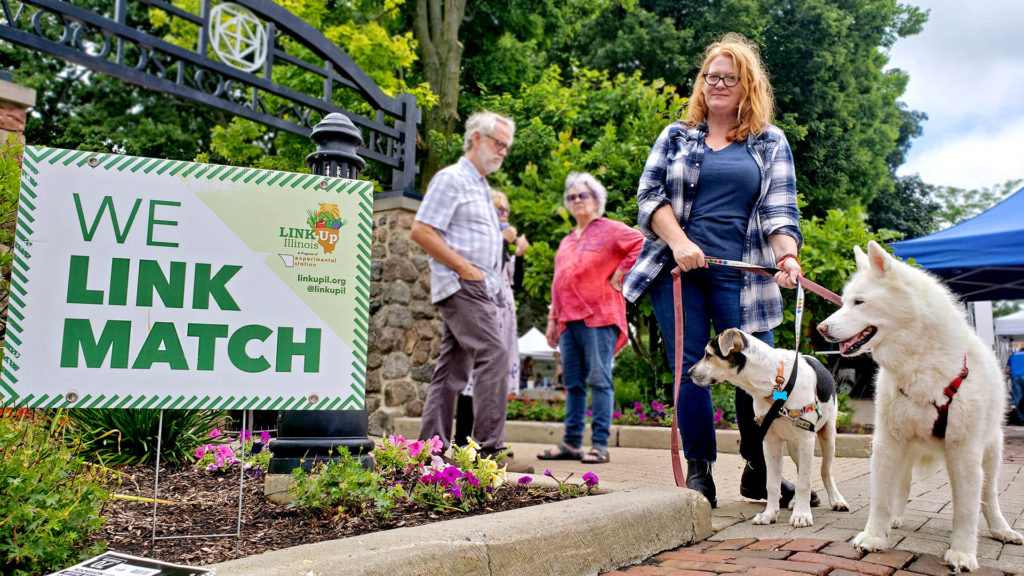
The food is fresher, lasts longer, and I’m not wasting and throwing things away. Also, talking to our farmers and learning about how much they love their animals, how they really are a part of their family, makes me feel better about what I’m feeding my family.
Surprising things have changed in my buying habits, like buying meat from Terra Vitae farms at the market. I cannot buy meat at a grocery store anymore. I love showing my guests the happy animals at the farms, so that people can feel better about eating it.
Link up to a Farmers’ Market Near You
As Kelly stressed, one of the best things we can do is spread awareness of the Link match programs offered at farmers’ markets. Pork consumers prefer to buy crate-free meat, with 71% reporting that they’d pay a higher price for pork from suppliers that eliminated the cruel confinement practices used by most supermarket retailers. When your daily food benefits are only $5.51 per household member it can be hard to justify that price increase. Link helps 1 in 7 Illinois residents put food on the table.
Crate Free USA has gathered farmers’ market information (and hundreds of local farmers who sell direct to consumer) from all over the state on our interactive mobile app, the Illinois Guide to Factory Free Meat, Dairy, & Eggs, to make it easier for families to have access to locally raised , sustainable meat products. You can download the app to find Illinois markets that accept Link and offer the Link Match Program near you with a quick search.
Author bio
Sam Damiano is a data and marketing specialist who has held multiple volunteer roles for Crate Free USA since December of 2016. She enjoys volunteering and takes pride in working with a variety of non-profit organizations fighting for a better world for humans and animals. Outside of work and volunteering, she can be found surrounded by dogs, building guitars, or practicing martial arts.
